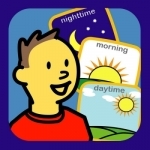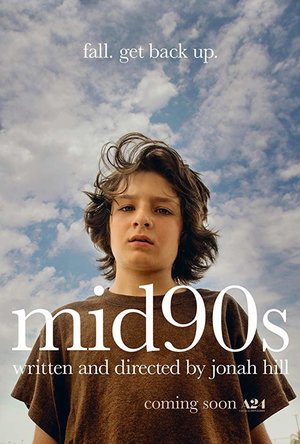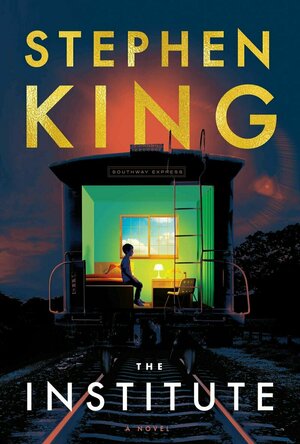Search

Bloomz: For Teachers & Schools
Education and Social Networking
App
One app for all your parent communication. Bloomz is the FREE award-winning app that saves teachers...
Emma @ The Movies (1786 KP) rated Mid90s (2018) in Movies
Jun 22, 2019 (Updated Sep 25, 2019)
At 1 hour 25 minutes you'd be forgiven for thinking this would be a brief affair, but if you're not into it then this 85-minute film is agonisingly long.
Going into this the only thing I knew about this film was that it was directed by Jonah Hill, and I like him so that felt like something positive.
31 people had booked to see this preview at my Cineworld, I think there were maybe 10 of us that showed up. I have to say that there wasn't a lot of enthusiasm from any of us until it was time to leave.
Kudos on going with the 4:3 look on the screen and the grainier quality on the filming (I'm sure there are technical terms for that but I don't know them!) That combined with accurate costumes and settings to really take you back to the 90s. I found the smaller aspect to be rather distracting on the big screen though. I watch 4:3 a lot at home on my widescreen TV without it seeming odd, perhaps this is just one of those things, I go so often that I'm probably just expecting it to fill the whole screen.
The film starts with a particularly jarring scene, and while I don't have an issue with that shock impact I don't like that there's no context. You can infer things later on, but at no point do you explicitly find out the reason behind some of the shocking scenes. The film feels much more like we've been plonked down into his life rather than learning about it.
It's difficult to sum up how I feel about the characters.
Sunny Suljic is fine in the main role but there wasn't anything that wowed me from the role. That's no slur on the acting, I just didn't feel that the dialogue or story gave us more than a glance at his life.
Ray came across as the strongest out of all the skaters, we see a few different aspects of him and he gets a proper chance to open up. Had all the characters had this opportunity then I think we'd have had something much more interesting... but then teenage boys aren't notoriously fans of opening up emotionally on screen unless we're in a romantic film.
Those of you who read my reviews will know how I feel about Lucas Hedges, that is to say, I don't really get it. This role offers little backstory apart from the fact that he clearly has a long passion for beating the crap out of his brother, Stevie. Despite my growing indifference for him I feel like Hedges wasn't given enough time in the movie. I can see why he wasn't, Ian is hyper-aggressive and a very threatening presence so having more of him would have changed the dynamic a lot. Having more of him though might have allowed us to understand him a little bit more and take away some of the unanswered questions at the end of the film.
There are a lot of scenes with drug use and alcohol, and I can see those being relevant to the story, but the "sex" scene was uncomfortable and really didn't feel like it fit in at all. From the moment you see it coming to the point where the boys are prying out details of the encounter I sat there wondering why. Why it needed to be there and why the script was just so bad through it.
The ending was the only part of the film that actually made me feel anything for the characters and the events. That in itself is quite an achievement being that you can tell exactly what is coming. The way the final event is handled was visually striking and leads us into a moment where all the characters get to show something that finally feels like genuine emotion. I think it says a lot that the most effective bits of the film had no dialogue in them. The events at the end of this film saved Mid90s from getting one of the lowest ratings in my reviewing history.
I'd say that had they given over an extra 20 minutes to better character development then this would have been better, but I worry that an extra 20 minutes would just have made the event even more excruciating.
What you should do
I'm sure this has it's audience somewhere, after all, people seem to be raving about it. Sadly I am not that audience and I really can't recommend this to anyone.
Movie thing you wish you could take home
I love the idea of making customer skateboards.
Going into this the only thing I knew about this film was that it was directed by Jonah Hill, and I like him so that felt like something positive.
31 people had booked to see this preview at my Cineworld, I think there were maybe 10 of us that showed up. I have to say that there wasn't a lot of enthusiasm from any of us until it was time to leave.
Kudos on going with the 4:3 look on the screen and the grainier quality on the filming (I'm sure there are technical terms for that but I don't know them!) That combined with accurate costumes and settings to really take you back to the 90s. I found the smaller aspect to be rather distracting on the big screen though. I watch 4:3 a lot at home on my widescreen TV without it seeming odd, perhaps this is just one of those things, I go so often that I'm probably just expecting it to fill the whole screen.
The film starts with a particularly jarring scene, and while I don't have an issue with that shock impact I don't like that there's no context. You can infer things later on, but at no point do you explicitly find out the reason behind some of the shocking scenes. The film feels much more like we've been plonked down into his life rather than learning about it.
It's difficult to sum up how I feel about the characters.
Sunny Suljic is fine in the main role but there wasn't anything that wowed me from the role. That's no slur on the acting, I just didn't feel that the dialogue or story gave us more than a glance at his life.
Ray came across as the strongest out of all the skaters, we see a few different aspects of him and he gets a proper chance to open up. Had all the characters had this opportunity then I think we'd have had something much more interesting... but then teenage boys aren't notoriously fans of opening up emotionally on screen unless we're in a romantic film.
Those of you who read my reviews will know how I feel about Lucas Hedges, that is to say, I don't really get it. This role offers little backstory apart from the fact that he clearly has a long passion for beating the crap out of his brother, Stevie. Despite my growing indifference for him I feel like Hedges wasn't given enough time in the movie. I can see why he wasn't, Ian is hyper-aggressive and a very threatening presence so having more of him would have changed the dynamic a lot. Having more of him though might have allowed us to understand him a little bit more and take away some of the unanswered questions at the end of the film.
There are a lot of scenes with drug use and alcohol, and I can see those being relevant to the story, but the "sex" scene was uncomfortable and really didn't feel like it fit in at all. From the moment you see it coming to the point where the boys are prying out details of the encounter I sat there wondering why. Why it needed to be there and why the script was just so bad through it.
The ending was the only part of the film that actually made me feel anything for the characters and the events. That in itself is quite an achievement being that you can tell exactly what is coming. The way the final event is handled was visually striking and leads us into a moment where all the characters get to show something that finally feels like genuine emotion. I think it says a lot that the most effective bits of the film had no dialogue in them. The events at the end of this film saved Mid90s from getting one of the lowest ratings in my reviewing history.
I'd say that had they given over an extra 20 minutes to better character development then this would have been better, but I worry that an extra 20 minutes would just have made the event even more excruciating.
What you should do
I'm sure this has it's audience somewhere, after all, people seem to be raving about it. Sadly I am not that audience and I really can't recommend this to anyone.
Movie thing you wish you could take home
I love the idea of making customer skateboards.

Choiceworks
Education and Medical
App
The Choiceworks app is an essential learning tool for helping children complete daily routines...
Hadley (567 KP) rated The Institute in Books
Oct 24, 2019
Likable characters (1 more)
Paranormal
Sexualizing children (1 more)
Not a regular King story
At around 95 novels, Stephen King, who is one of the most well-known authors of our time, debuts a possible new novel series about psychic children. 'The Institute' mostly takes place in a hidden facility located in a wooded area of Maine,where readers follow a kidnapped child prodigy named Luke Ellis, and the government experiments that are inflicted on him to heighten his psychic powers.
So why is the government kidnapping children to conduct psychic research on them? At first, it may seem just that: psychic research, because psychic powers seem to be more powerful in young children than adults, but nothing is what it seems. As the boss of this Institute says to the children: " ' There's a war going on, and you have been called upon to serve your country.' " A few sentences later, and she explains it a little more in depth for Ellis: " ' This is not an arms race but a mind race, and if we lose, the consequences would be more than dire; they would be unimaginable. You may only be twelve, but you are a soldier in an undeclared war. The same is true of Kalisha and the others. Do you like it? Of course not. Draftees never do, and draftees sometimes need to be taught that there are consequences for not following orders. I believe you've already had one lesson in that regard. If you're as bright as your records say you are, perhaps you won't need another. If you do, however, you'll get it. This is not your home. This is not your school. You will not simply be given an extra chore or sent to the principal's office or given detention; you will be punished. Clear? ' "
King writes in a third-person point-of-view, which makes it a little disturbing that when any female character he introduces (including girls as young as 11-years-old) are usually introduced by their breast size. It's not uncommon for male writers to introduce female characters this way, but when most of them are children, it can be very off putting for readers. One scene, King makes Ellis notice that Kalisha has 'her hands on her mostly nonexistent hips,' then writes about the character Helen in the same scene: " Another door opened and Helen Simms appeared, clad - - - sort of - - - in what Luke believed were called babydoll pajamas. She had hips, plus other interesting equipment. " Both of these characters are only twelve-years-old.
Aside from the children, King also introduces an important character named Tim Jamieson. This character starts the novel off before readers meet Ellis; we learn that he is a former cop who is traveling to New York while taking odd jobs on his way there, including a night knocker job in DuPray, South Carolina (which becomes very important later on in the story) .
Avery, my personal favorite character in the book, is a ten-year-old who acts like a five-year-old, " The screamer was a little boy in Star Wars pajamas, hammering on doors with small fists that went up and down like pistons. Ten? Avery Dixon looked six, seven at most. The crotch and one leg of his pajama pants were wet and sticking to him. " Dixon and Kalisha are both in the Institute for telepathy. " 'You know so,' Kalisha said, and began to stroke the little boy's [Dixon] hair again. Like had a sense - - - maybe bullshit, maybe not - - - that a lot was going on between them. Inside traffic. " And quickly, the group of children become protective of Dixon, " 'But you need to take care of this one for as long as you can. When I think of Tony or Zeke or that bitch Winona hitting Avery, it makes me want to cry. ' " Kalisha confides in Ellis.
Kalisha, one of the other children that has been kidnapped, is another very likable character that seems to keep all of the other kids' spirits up by either keeping them out of trouble with advice or stopping small fights between them. Another kid named Nicky, the troublemaker of the group, is the stereo-typical bad boy. He gets involved in fistfights with the orderlies that work at the Institute, taking quite a bit of abuse in return. But eventually, the rebelliousness catches up with him, leading him to be moved from Front Half to the dreaded Back Half.
Readers later learn that Back Half is worse than Front Half. Most questions we may have about why the Institute is abusing these children are all answered when readers get to see into Back Half from Kalisha's point-of-view. But what is left unanswered is exactly how many children have been through the Institute? From the amount of children seen just in this story, the numbers could be in the hundreds of thousands!
But, as expected, the children come up with a plan to escape - - - with giving as little detail as possible, an orderlie at the Institute is helped by one of the children with a personal problem, and in return, this orderlie decides to help one of them escape and reveal everything that is the Institute. The instance the escape starts being discussed is when the book really picks up.
King's writing of the abuse our characters sustain is very real (" When Stevie Whipple asked where he'd been and what was wrong, Luke just shook his head. He didn't want to talk about the tank. Not now, not ever. He supposed it was like being in a war. You got drafted, you went, but you didn't want to talk about what you'd seen, or what had happened to you there." ) The scene in which Ellis refuses to speak of is where the orderlie Zeke is trying to make Ellis confess that he is not only telekinesis, but also telepathic: "Zeke hauled him up by the hair. His white tunic was soaked. He looked fixedly at Luke. 'I'm going to put you down again, Luke. Again and again and again. I'll put you down until you drown and then we'll resuscitate you and drown you again and resuscitate you again. Last chance: what number am I thinking of?' "
King brings up a fictional belief that strikes fear in parents everywhere: children being kidnapped for government experiments. Readers witness Ellis' parents being killed, Kalisha being a surrogate mother to kids she barely knows, Nicky being beaten by adults when he refuses to get 'shots for dots,' night terrors, suicide, zap sticks and murder.
This book doesn't read like a regular King book; even with the paranormal aspects occurring in it, it doesn't add up to much. The horror aspect is more in the form of child abuse then paranormal moments. I would only recommend this book to fans of Netflix's 'Stranger Things' and Patterson's 'Maximum Ride.' I don't think I would read this again.
So why is the government kidnapping children to conduct psychic research on them? At first, it may seem just that: psychic research, because psychic powers seem to be more powerful in young children than adults, but nothing is what it seems. As the boss of this Institute says to the children: " ' There's a war going on, and you have been called upon to serve your country.' " A few sentences later, and she explains it a little more in depth for Ellis: " ' This is not an arms race but a mind race, and if we lose, the consequences would be more than dire; they would be unimaginable. You may only be twelve, but you are a soldier in an undeclared war. The same is true of Kalisha and the others. Do you like it? Of course not. Draftees never do, and draftees sometimes need to be taught that there are consequences for not following orders. I believe you've already had one lesson in that regard. If you're as bright as your records say you are, perhaps you won't need another. If you do, however, you'll get it. This is not your home. This is not your school. You will not simply be given an extra chore or sent to the principal's office or given detention; you will be punished. Clear? ' "
King writes in a third-person point-of-view, which makes it a little disturbing that when any female character he introduces (including girls as young as 11-years-old) are usually introduced by their breast size. It's not uncommon for male writers to introduce female characters this way, but when most of them are children, it can be very off putting for readers. One scene, King makes Ellis notice that Kalisha has 'her hands on her mostly nonexistent hips,' then writes about the character Helen in the same scene: " Another door opened and Helen Simms appeared, clad - - - sort of - - - in what Luke believed were called babydoll pajamas. She had hips, plus other interesting equipment. " Both of these characters are only twelve-years-old.
Aside from the children, King also introduces an important character named Tim Jamieson. This character starts the novel off before readers meet Ellis; we learn that he is a former cop who is traveling to New York while taking odd jobs on his way there, including a night knocker job in DuPray, South Carolina (which becomes very important later on in the story) .
Avery, my personal favorite character in the book, is a ten-year-old who acts like a five-year-old, " The screamer was a little boy in Star Wars pajamas, hammering on doors with small fists that went up and down like pistons. Ten? Avery Dixon looked six, seven at most. The crotch and one leg of his pajama pants were wet and sticking to him. " Dixon and Kalisha are both in the Institute for telepathy. " 'You know so,' Kalisha said, and began to stroke the little boy's [Dixon] hair again. Like had a sense - - - maybe bullshit, maybe not - - - that a lot was going on between them. Inside traffic. " And quickly, the group of children become protective of Dixon, " 'But you need to take care of this one for as long as you can. When I think of Tony or Zeke or that bitch Winona hitting Avery, it makes me want to cry. ' " Kalisha confides in Ellis.
Kalisha, one of the other children that has been kidnapped, is another very likable character that seems to keep all of the other kids' spirits up by either keeping them out of trouble with advice or stopping small fights between them. Another kid named Nicky, the troublemaker of the group, is the stereo-typical bad boy. He gets involved in fistfights with the orderlies that work at the Institute, taking quite a bit of abuse in return. But eventually, the rebelliousness catches up with him, leading him to be moved from Front Half to the dreaded Back Half.
Readers later learn that Back Half is worse than Front Half. Most questions we may have about why the Institute is abusing these children are all answered when readers get to see into Back Half from Kalisha's point-of-view. But what is left unanswered is exactly how many children have been through the Institute? From the amount of children seen just in this story, the numbers could be in the hundreds of thousands!
But, as expected, the children come up with a plan to escape - - - with giving as little detail as possible, an orderlie at the Institute is helped by one of the children with a personal problem, and in return, this orderlie decides to help one of them escape and reveal everything that is the Institute. The instance the escape starts being discussed is when the book really picks up.
King's writing of the abuse our characters sustain is very real (" When Stevie Whipple asked where he'd been and what was wrong, Luke just shook his head. He didn't want to talk about the tank. Not now, not ever. He supposed it was like being in a war. You got drafted, you went, but you didn't want to talk about what you'd seen, or what had happened to you there." ) The scene in which Ellis refuses to speak of is where the orderlie Zeke is trying to make Ellis confess that he is not only telekinesis, but also telepathic: "Zeke hauled him up by the hair. His white tunic was soaked. He looked fixedly at Luke. 'I'm going to put you down again, Luke. Again and again and again. I'll put you down until you drown and then we'll resuscitate you and drown you again and resuscitate you again. Last chance: what number am I thinking of?' "
King brings up a fictional belief that strikes fear in parents everywhere: children being kidnapped for government experiments. Readers witness Ellis' parents being killed, Kalisha being a surrogate mother to kids she barely knows, Nicky being beaten by adults when he refuses to get 'shots for dots,' night terrors, suicide, zap sticks and murder.
This book doesn't read like a regular King book; even with the paranormal aspects occurring in it, it doesn't add up to much. The horror aspect is more in the form of child abuse then paranormal moments. I would only recommend this book to fans of Netflix's 'Stranger Things' and Patterson's 'Maximum Ride.' I don't think I would read this again.

